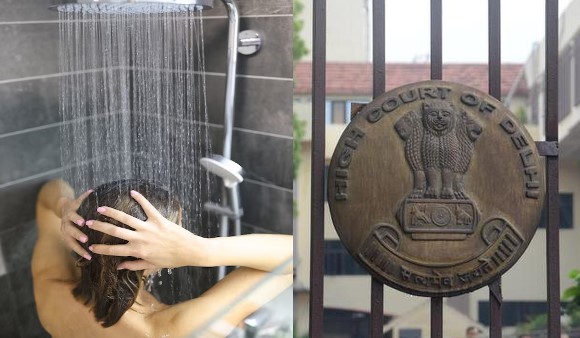
The Delhi High Court recently held that taking a bath in a bathroom is a ‘private act’ even if the bathroom is a public bathroom and doesn’t have a door but only a curtain.
Hence, if a person peeps into such a bathroom when a woman is taking a bath, it would attract the criminality of voyeuristic behavior under Section 354C of the Indian Penal Code (IPC).
Justice Swarana Kanta Sharma observed that when a woman takes bath inside a closed bathroom will reasonably expect that her privacy is not invaded and she is not seen or watched.
The Court underlined that “The act of a perpetrator peeping inside the said bathroom will certainly be regarded as an invasion of her privacy… The sexual integrity of every person has to be respected and any violation of the same should be dealt with a stern hand.”
Justice Sharma dealt with an appeal filed by a convict named Sonu @ Billa who was convicted by the trial court for offense under Section 354C of the IPC and Section 12 of The Protection of Children from Sexual Offences (POCSO) Act, 2012.
Therefore, Sonu was sentenced to undergo rigorous imprisonment for a period of one year and a fine of ₹20,000.
The complaint was registered against the convict in September 2014 after a minor girl alleged that he used to look at her with sexual intent and whenever she would go to take bath, he would stand outside the bathroom on different pretexts and peep inside the bathroom.
It was also stated that he used to pass vulgar remarks, comments, and gestures against her.
Sonu’s counsel argued that the victim would take a bath in the bathroom situated outside her jhuggi in a public place and therefore the same can be equated with taking bath in the holy rivers, water parks, swimming pools, or lakes.
After considering the case, Justice Sharma noted that the bathroom in question, though situated in an open area, wasn’t an open public space because it had walls and the entrance was covered with a curtain.
The Court said that “The argument of the learned counsel for the appellant that the act of taking bath by the victim in the present case, instead of being a ‘private act’ became a ‘public act’ is totally meritless. Merely because a structure that is being used as a bathroom by a woman does not have a door but only a curtain and temporary walls and it is situated outside her house does not make it a public place and the contention that the act of taking bath by the victim became a ‘public act’ instead of being a ‘private act’ for the said reason has to be outrightly rejected.”
Therefore, it held that when the ingredients of Section 354C are tested in the factual situation of the present case, it is squarely covered by the definition of Section 354C IPC read with Explanation 1 which defines ‘private act’.
Justice Sharma further observed that taking holy dip at the religious places can’t be equated with a closed bathroom where a female is taking bath.
However, the court said that even in the case of taking bath in a public open space, there will be ‘reasonable expectation’ that photographs or videos of such women aren’t taken or circulated.
The Court said that “Even in those cases, it will amount to invading her privacy. No person has a right, even in that situation, to take her photographs, videos etc. as envisaged under Section 354C of IPC and the Explanation thereto.”
Therefore, the bench, concluded that the act of the accused amounted to breach of privacy and the trial court order doesn’t suffer from any infirmity.
However, it set aside that the conviction under POCSO noting that the prosecution was not able to prove that the victim was less than 18 years of age.
the Court held that “In view thereof, impugned judgment dated 15.11.2021, to the extent of conviction of appellant under Section 12 of POCSO Act, is set aside… The impugned judgment dated 15.11.2021 and order on sentence dated 15.12.2021, insofar as they relate to conviction and sentencing under Section 354C of IPC, are hereby upheld.”




